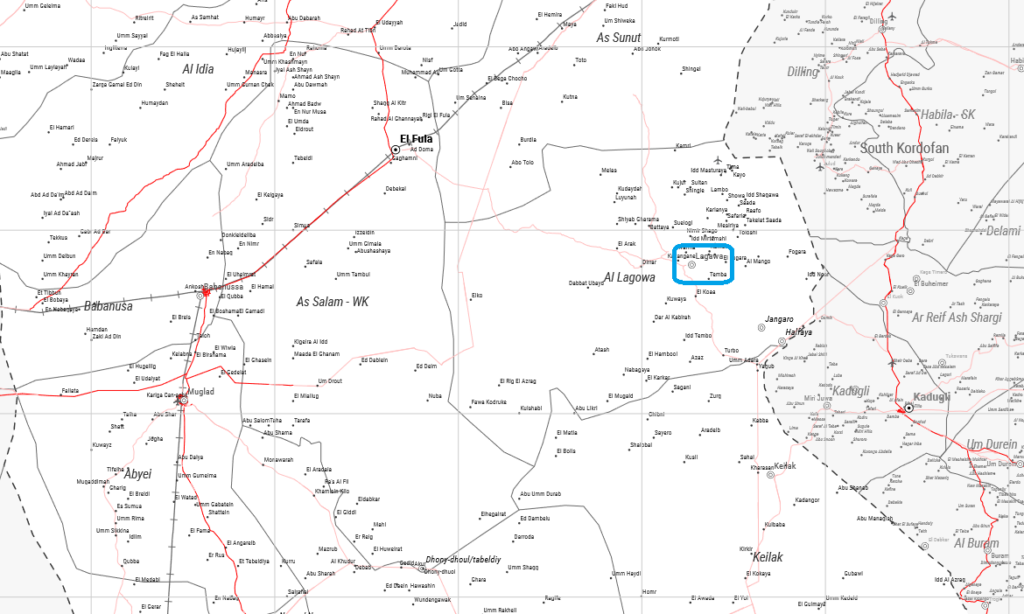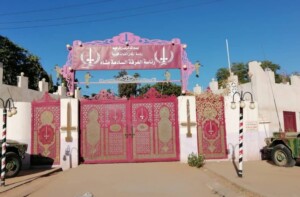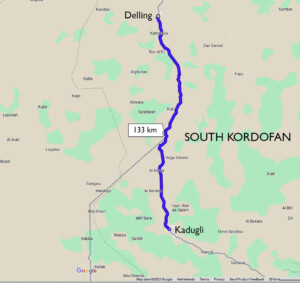Sudan war: Khartoum shelling continues, Nyala faces exodus, Lagawa attacked by rebels

Lagawa town (UN OCHA map of West Kordofan)
The fighting between the Sudan Armed Forces (SAF) and its paramilitary counterpart, the Rapid Support Forces (RSF), continued in the Sudanese capital this weekend. The South Darfur capital of Nyala witnessed a cautious calm since Saturday after the RSF took control of the city. In West Kordofan, the army is preparing to secure the eastern part of the state after an attack by the Sudan People’s Liberation Movement North under the leadership of Abdelaziz El Hilu (SPLM-N El Hilu) on Lagawa town.
The Sudanese air force continued to bomb targets in Jebel Aulia in southwest Khartoum yesterday morning, while the Rapid Support Forces (RSF) shelled the Jebel Auliya Grand Market.
“At 9:00 this morning, the RSF began shelling again. This time, they targeted the Jebel Aulia Market. Several missiles hit the place,” a listener told Radio Dabanga yesterday.
“The market was working on less than half of its power anyway, due to the weak purchasing power of the people still present, as they spent all their savings already,” he stated.
The source further said that large numbers of people fled Jebel Aulia because of the heavy fighting that erupted in various parts of the locality since the beginning of this month.
“The Jebel Aulia Hospital has closed its doors for more than two weeks now because of the continued artillery shelling,” he said. He also reported the partial restoration of electricity to the southern neighbourhoods of Jebel Aulia after a blackout of more than three weeks.
The Emergency Room of Jebel Aulia yesterday accused the RSF of filling the southern neighbourhoods of Jebel Aulia with tear gas on Friday and Saturday.
The RSF simultaneously launched attacks on the SAF General Command in downtown Khartoum and the El Shajara complex on Saturday.
The army reportedly repelled RSF attacks on the armoured vehicles department at the El Shajara military compound during the weekend.
Army soldiers have combed the Ombadda neighbourhoods in Omdurman, the SAF announced yesterday as well. Dozens of RSF troops were allegedly killed and several of their vehicles seized.
‘Mass exodus’
A medical source reported to Radio Dabanga yesterday that the South Darfur capital has been witnessing a cautious calm since Saturday after the RSF took control of the city on Thursday.
The source, who works for the Department of Accidents, Surgery and Operations at the El Wehda Hospital in Nyala South, told Radio Dabanga that 15 people were killed and 156 others were injured by the SAF-RSF battles for Nyala between September 29 and October 28.
The management of the hospital reported an acute shortage of life-saving medicines, intravenous means and other medical needs to save the lives of people hit by missiles or bullets, and appealed to “international and national relief organisations to provide medical assistance to hospitals operating in South Darfur”.
On Friday, RSF Deputy Commander Abdelrahim Dagalo, brother of RSF Commander ‘Hemedti’, called on the people in Nyala to return to their homes. Nyala Police Chief Maj Bashir Eisa directed prosecutors to secure the people’s safety and resume basic services, including the opening of markets and hospitals.
Residents of the city however told Radio Dabanga that the mass exodus of residents from the northern parts of Nyala continues.
West Kordofan
Following an attack by the SPLM-N El Hilu on Lagawa town in the Nuba Mountains in West Kordofan on Tuesday, the SAF held a meeting with native administration* leaders in Babanousa on Saturday.
The commander of the 22nd Infantry Division in Babanousa, Maj Muawia Hamed, told the participants that the SAF will continue to secure the area, saying “The security of the people is a red line that cannot be tolerated”.
The security meeting was attended by Sadig El Hereika, nazir** of the Misseriya El Zurug, and several native administration leaders in Lagawa to discuss securing the town and its surroundings.
In June, about two months after war broke out between the SAF and the paramilitary RSF, the SPLM-N El Hilu began to attack army bases in South Kordofan and the southern part of the Blue Nile region. Fighting between the army and the rebel movement continued the following months. On September 5, Radio Dabanga reported renewed attacks on the army base of Kadugli, capital of South Kordofan.
* The Native Administration was instituted by British colonial authorities seeking a pragmatic system of governance that allowed for effective control with limited oversight by the state. The state-appointed tribal leaders were also responsible for executing policies, collecting taxes, and mobilising labour on behalf of the central government. According to the Darfur Bar Association (DBA), the Native Administration during the 30-year rule of dictator Omar Al Bashir did not represent the real community leaders.
** A nazir is a state-appointed administrative chief of a tribe or clan.











 and then
and then